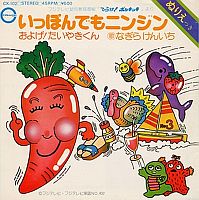Kanji
(1)いっぽんでも ニンジン
(2)にそくでも サンダル
(3)さんそうでも ヨット
(4)よつぶでも ゴマシオ
(5)ごだいでも ロケット
(6)ろくわでも シチメンチョウ
(7)しちひきでも ハチ
(8)はっとうでも クジラ
(9)きゅうはいでも ジュース
(10)じゅっこでも イチゴ
いちご にんじん サンダル
ヨット ごましお ロケット
しちめんちょう
はち くじら ジュース
(1)いっぽんでも ニンジン
(2)にそくでも サンダル
(3)さんそうでも ヨット
(4)よつぶでも ゴマシオ
(5)ごだいでも ロケット
(6)ろくわでも シチメンチョウ
(7)しちひきでも ハチ
(8)はっとうでも クジラ
(9)きゅうはいでも ジュース
(10)じゅっこでも イチゴ
いっぽん にそく さんそう
よつぶ ごだい ろくわ
しちひき はっとう
きゅうはい じゅっこ |
Romaji
1. Ippon demo Ninjin
2. Nisoku demo Sandaru
3. Sansou demo Yotto
4. Yotsubu demo Gomashio
5. Godai demo Roketto
6. Rokuwa demo Shichimencho
7. Shichihiki demo Hachi
8. Hattou demo Kujira
9. Kyuuhai demo Juusu
10. Jukko demo Ichigo
Ichigo Ninjin Sandaru
Yotto Gomashio Roketto
Shichimencho
Hachi Kujira Juusu
1. Ippon demo Ninjin
2. Nisoku demo Sandaru
3. Sansou demo Yotto
4. Yotsubu demo Gomashio
5. Godai demo Roketto
6. Rokuwa demo Shichimencho
7. Shichihiki demo Hachi
8. Hattou demo Kujira
9. Kyuuhai demo Juusu
10. Jukko demo Ichigo
Ichigo Ninjin Sandaru
Yotto Gomashio Roketto
Shichimencho
Hachi Kujira Juusu |
Translation
1 - If there is one carot, we say Ninjin
2 - If there are two pairs of sandals, we say Sandaru
3 - If there are three yachts, we say Yotto
4 - If there are four sesame, we say Gomashio
5 - If there are five rockets, we say Roketto
6 - If there are six turkeys, we say Shichimenchou
7 - If there are seven bees, we say Hachi
8 - If there are nine whales, we say Kujira
9 - If there are nine cups, we say Juice
10 - If there are ten strawberrys, we say Ichigo
Strawberry, carot, sandals
Yacht, sesame, rocket
Turkey
Bee, whale, juice
1 - If there is one carot, we say Ninjin
2 - If there are two pairs of sandals, we say Sandaru
3 - If there are three yachts, we say Yotto
4 - If there are four sesame, we say Gomashio
5 - If there are five rockets, we say Roketto
6 - If there are six turkeys, we say Shichimenchou
7 - If there are seven bees, we say Hachi
8 - If there are nine whales, we say Kujira
9 - If there are nine cups, we say Juice
10 - If there are ten strawberrys, we say Ichigo
one pen, two socks, three boats
Four pills, five vehicles, six birds
Seven small animals
Eight big animals, nine drinks, ten small things |
Notes:
Japanese uses different systems of counting depending on what noun is being counted
Also, the song puns numbers: the word carrot (ninjin) begins with the same sound as the number two (ni) but there is only one carrot, the word sandal begins with the same sound as the number three (san), but there are two sandals, yacht sounds like the number four, but there are three yachts, ect. So, why the turkeys? Well, there are six turkeys, but they are called shichimenchou (shichi means seven).
1: We count pencil-type goods as ippon-nihon-sanbon-yonhon-gohon-roppon-nanahon-hachihon-kyuuhon-joppon
2: We count shoes as issoku-nisoku-sanzoku-yonsoku-gosoku-rokusoku-nanasoku-hassoku-kyuusoku-jyussoku
3: We count ships as issou-nisou-sansou-yonsou-gosou-rokusou-nanasou-hassou-kyuusou-jyussou
4: We count grains as hitotsubu-futatsubu-mitsubu-yotsubu-gotsubu-rokutsubu-nanatsubu-hachitsubu-kyuutsubu-jyuttsubu
5: We count large vehicles as ichidai-nidai-sandai-yondai-godai-rokudai-nanadai-hachidai-kyuudai-jyuudai.
6: We count birds as ichiwa-niwa-sanwa-yonwa-gowa-rokuwa-nanawa-hachiwa-kyuuwa-jyuuwa.
7: We count insects as ippiki-nihiki-sanbiki-yonhiki-gohiki-roppiki-nanahiki-happiki-kyuuhiki-jyuppiki
8: We count animals as ittou-nitou-santou-yontou-gotou-rokutou-nanatou-hachitou-kyuutou-jyuttou.
9: We count cups of drinks as ippai-nihai-sanbai-yonhai-gohai-roppai-nanahai-hachihai-kyuuhai-jyuppai.
10: We count small goods as ikko-niko-sanko-yonko-goko-rokko-nanako-hakko-kyuuko-jyukko. |
